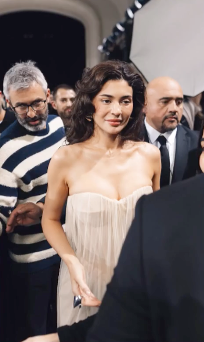 Woodman. DailyWire+.
Woodman. DailyWire+.
The “Gen Z is aging like milk” type of talk has peppered the internet over the last six or more months as claims that Gen Z looks much older than their actual age have continued to surface.
Seemingly paradoxically, modern beauty trends are all the rage among Gen Z, and it’s not just heavy makeup; it’s filler, Botox, and even plastic surgery. But if these procedures are supposed to make you look younger, what’s really going on? Has Gen Z undergone some kind of generational, genetic change? Or is it possible that filler and Botox are backfiring, causing Gen-Z women to actually look older?
One of the first videos I ran across that addressed this issue was one in which a guy explains that no one believes he is Gen Z, though he is, in fact, 26-years-old. He says when he is with his mom in public, people think she is his younger sister. He concludes that Gen Z definitely looks older.
While the internet at-large is wondering what’s going on, he is just one of the numerous Gen Zs panicking about this. There has been so much discussion about it that journalists have written entire articles contemplating what’s going on. The New York Times jumped in with one titled, “Why Does Gen Z Believe It’s ‘Aging Like Milk’?”
From Dazed, an article asks, “Is Gen Z really ageing faster?” with a subheading that reads, “According to social media, young people are ageing prematurely due to their penchant for Elf Bars and retinol — but is there really any truth behind these theories?”
The New York Post joined the conversation with “Gen Z is aging worse than millennials — here are the alarming reasons why.”
The overall consensus from journalists — and Gen Zs themselves — is that there are a myriad of reasons contributing to Gen Z’s rapid aging. Some argue it’s due to stress. They pose that we’ve lived through September 11, political unrest, COVID, Biden’s presidency, and a now-atrocious economy. But although today’s world is stressful, we must admit that older generations have objectively lived through far tougher times. So stress doesn’t really seem to be a logical conclusion.
WATCH: The Comments Section with Brett Cooper on DailyWire+
I tend to think Gen Z looks older because of our diet and the terrible processed foods we put in our bodies every single day. While it might sound cliche, it’s true that your skin health and its radiance starts from within. Alcohol, cigarettes, vapes — my generation loves a vape — all have an impact on skin’s elasticity, coloration, and overall appearance. What we put inside of our bodies definitely affects the outside of our bodies.
However, I think what is mainly causing rapid aging among Gen Z women is the trendy makeup and skincare routines. Young skin does not need retinol or the heavy duty chemical products that my generation is slathering on their skin morning, noon, and night. But celebrities and social media have worked hard to convince women that they do need such products. They rave about how they’re necessary and every woman — from their mid-20s down to 12-year-olds — should be spending hundreds upon hundreds of dollars on daily skincare products, facials, and procedures.
This was a point made by the New York Post, who explained what happens when women seek out procedures at too young of an age:
While it may seem like Gen Zers are taking good care of themselves, practitioners aren’t so sure — in fact, starting injectables too young can affect the natural development of facial features.
Yes, injecting a toxin into your skin that stops nerve endings from working would hinder and even stunt skin’s development. It’s a toxin. So of course it likely has a negative consequence. That’s just common sense. The Post continues, writing:
It is not uncommon to see 18-year-olds with lip filler,” Dr. Ross Perry, the medical director of Cosmedics Skin Clinics, told the Daily Mail this week. He added that “20-year-olds are [getting] Botox and fillers, semi-permanent makeup in the form of eyebrows and lips.” These procedures “combined can make you appear older,” Perry said, and “actually once you start down this route, it’s very hard to go back to being entirely natural, especially when the ‘affirmations’ start on social media.” … “Having these treatments before they’re truly needed can sometimes make someone appear older, with an almost mask-like appearance,” said Shotter, who also blamed interest in the procedure on the trendy full-glam makeup look touted by social media influencers.
One prime “trendy full-glam makeup” Gen-Z social media influencer comes to mind: Kylie Jenner. She caught some flack online last year with people saying she looks decades older than she is — naming all her cosmetic procedures as the culprits. Just three months after her 26th birthday, the Mirror published an article in the midst of her being “slammed over fillers as fans complained that she looks ‘too old.’” Apparently, “fans were shocked” by her appearance at a Hollywood party, citing “her prematurely ageing features, despite her only being in her mid-20s.” They specifically blamed her fillers. Some suggested she should have them dissolved, but others said if she had them dissolved at this point, her skin would sag from being stretched.


Screenshots: The Comments Section
Kylie is far from the only face who’s gotten this kind of scrutiny. You can find these “I look old” confessions all over TikTok. One girl tells about someone who asked her boyfriend how old she is, and he jokingly said 47. The response? “Oh, I thought she was early 30s.” Come to find out, this girl is 23-years-old.
Though 10 years older is an extreme jump, the comments didn’t disagree. One commenter genuinely seemed confused, suggesting perhaps Gen Z’s style could be to blame because they are not “wrinkley or anything.” But the problem is the opposite of wrinkles. It’s the baby Botox, it’s the lip filler, and it’s everything they are doing not to have wrinkles.


Screenshots: Instagram
Another Gen Z posted a response video to someone who had told her she looks 45 and should stop getting filler or Botox. She was shocked — because she is 22 years old. She goes on to explain that she’s gotten a lot of hate about her “come get filler with me” TikToks from people who believe you shouldn’t get cosmetic procedures but concludes saying, “I feel like no one should stop you from getting filler because it’s your own face.” The commenters thought otherwise.
Screenshots: TikTok


Screenshots: X
She is correct that it is, indeed, your prerogative to make decisions about your own face. But the reality is, it does make you look older, and young women should be warned about the consequences of these types of procedures. The pressure to get them is real, but it is insane, especially at such a young age. They have been made out to seem completely normal when there is nothing normal about them. There is absolutely no need to have brows laminated to the sky nor a full set of lashes glued on top of an already perfectly beautiful pair.
Furthermore, this is why so many girls online and in real life look exactly the same today. When I scroll through Instagram and see a group photo of girls, some of whom I know and others who are mutual acquaintances, they quite often look just alike. They have had their nerve endings frozen in the same way, used the same type of filler, had their faces puffed and poked in various areas so they appear more symmetrical, had their smile adjusted one way or another, and undergone a whole slew of other procedures. The end result, sadly, lands them all looking the same. It is a total loss of individuality.
Maybe it’s true that Gen Z is aging faster because of stress. Maybe it’s the environment, or maybe it’s our diet. But the solution is not this. Pumping toxins into your skin and slathering chemicals all over your face will only make this worse for young people. Instead, we should be focusing on the types of food we’re eating, the freshness of air we’re breathing, the level of sunlight we’re getting, and the amount of water we’re drinking. In a chemically driven world, these are the things that are far better for you in the long run.
After all, no one wants to age like milk.

Continue reading this exclusive article and join the conversation, plus watch free videos on DW+
Create Free AccountAlready a member? Log in
Source link




